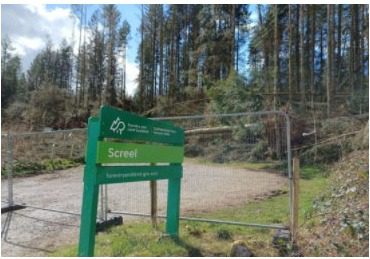Forestry and Land Scotland is urging members of the public to have more realistic expectations of when access to local storm-damaged forests will resume.
Almost a year on from the devastation of Storms Arwen, Malik and Corrie much of the storm damage is still to be cleared and some forest access is still restricted.
However, dealing with the aftermath of major storms is not simply a case of moving in with heavy, machinery and removing felled trees.
Immediately following the storms FLS worked with partner agencies to assess the damage and take immediate action to clear electricity power lines and public roads, as well as restore access to homes and for the emergency services.
Only after this was dealt with could the FLS team begin to assess the long-term clear-up operation and how to go about dealing with an amount of windblown trees that was equivalent to two years’ worth of timber harvesting.
David Leven, FLS East Region Manager, said;
“It is incredible to think that almost overnight we were presented with a new list of jobs that normally takes us at least two years to get done. This on top of our other work.
“There are also processes with clearing storm damage that include obtaining official permission – in the form of felling licences – to remove trees.
“Some of our forests have been so significantly impacted that a reset of our management plans and work plans over the next 30- 50 years has also been required. New opportunities for biodiversity gain and climate change mitigation have also been identified and need to be thought through. Supply of skills and equipment has also been in short supply and we have been actively recruiting more staff to help us to make faster progress.”
FLS also had to wait for survey flights to measure the extent of damage before it could then use that data to inform applications to Scottish Forestry for felling licenses and amendment’s. Scottish Forestry was also having to deal with private sector forestry interests looking to do the same things.
Once all licenses are in place, FLS is then required by law to undertake environmental surveys of the areas to identify if any protected species are present that will require further amendments to plans – such as scheduling work around nesting or breeding seasons.
David added;
“It is only at this stage that we can go ahead and deliver clear up works but in some cases such as Kirkhill, Tyrebagger and Countesswells this requires getting third party permissions for road closures, power line shut downs and traffic management.
“We have no say in when these things will happen so we get on with what we can elsewhere until such time as we can get to the more complicated locations and get our work done as safely and quickly as possible.”
In order to minimise any loss to the public purse from the storm damage, FLS also has to find a buyer for the timber that it clears which can be difficult in an already saturated market. Some types of timber are easier to sell than others due to size and mill capacity, so harder to sell product ‘clogs’ up stacking areas until such time as the timber can be sold and moved. This add further complication and delay to the clear-up work.
At all stages of this process the Health and Safety both of FLS staff and the public is a primary consideration in all decision making. Where no diversion options are available, for example, forests are kept closed, sometimes for longer than was initially expected.
The unprecedented, quick-succession storms last winter compounded the damage done at various sites and saw the number of affected sites steadily increase.
David, said;
“We have asked a lot of our staff, who have gone above and beyond to try and get sites cleared and access reinstated, but the pace of progress is outside out control .
“I understand the frustrations of people wanting to get back into their favourite forests and we have been working incredibly hard behind the scenes to resolve the many issues that those storms created and make them safe and we will continue to do so for some time to come. I’m really proud of every single one of our Team doing great work in challenging circumstances.”
FLS’s East Region team has successfully opened Foggieton Woods as well as access to Scolty Hill and car Park, with work ongoing to make safe the trails and the Deeside Way, which has diversions in place. Dunottar has also been the focus of considerable works, as was the Bennachie Centre, which was open in time for Easter this year.






